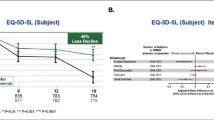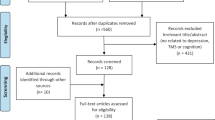Abstract
Purpose
The study investigated the prospective memory (PM) functioning among patients with brain metastases (BM), eligible for neurosurgy/radiosurgery, and its relationships with depression and quality of life (QoL).
Methods
This case-healthy-control, cross-sectional study, comprised 160 participants, including 49 patients with BM from various cancers treated with neurosurgery or radiosurgery. They were compared with 111 matched controls on a set of neuropsychological tests, including the MoCA global cognitive test and an experimental PM task ‘PROMESSE’. Participants also completed a depression scale (BDI-II), a generic (SF-12) and a specific (QLQ-C30) QoL instrument for cancer patients. Multivariate analyses were conducted on various PM outcomes, in particular on event-based (EBPM) and time-based (TBPM) PM performances.
Results
After adjusting for age and socio-cultural level, patients with BM performed worse than the control on the PM task (p < .0001) [OR 1.05; 95%CI (1.01–1.08)], whatever the location of BM (frontal versus temporal lobe). Patients with infratentorial BM exhibited better TBPM performances than patients with supratentorial BM (p = .02). The global PM performance was positively correlated with the MoCA (r = .45) and the SF-12 global score (r = .34), and negatively with the BDI-II score (r = − .20), the number of BM (r = − .34) and the volumetric of the BM (r = − 29). The TBPM performance was linked to the global QoL (r = .40) in patients.
Conclusion
The study showed a significant PM deficit in patients with BM eligible for a neurosurgy/radiosurgery, which is linked to damaged QoL and which likely maintains some depressive affects. Prospective memory rehabilitation program should especially focus on TBPM for post-operative patients with BM.
Similar content being viewed by others
References
Baschnagel A, Wolters PL, Camphausen K (2008) Neuropsychological testing and biomarkers in the management of brain metastases. Radiat Oncol 3:26. https://doi.org/10.1186/1748-717X-3-26
Brem S, Meyers CA, Palmer G et al (2013) Preservation of neurocognitive function and local control of 1 to 3 brain metastases treated with surgery and carmustine wafers: neurocognition and brain metastases. Cancer 119:3830–3838. https://doi.org/10.1002/cncr.28307
Kepka L, Tyc-Szczepaniak D, Osowiecka K et al (2017) Quality of life after whole brain radiotherapy compared with radiosurgery of the tumor bed: results from a randomized trial. Clin Transl Oncol. https://doi.org/10.1007/s12094-017-1703-5
Li J, Bentzen SM, Li J et al (2008) Relationship between neurocognitive function and quality of life after whole-brain radiotherapy in patients with brain metastasis. Int J Radiat Oncol Biol Phys 71:64–70. https://doi.org/10.1016/j.ijrobp.2007.09.059
Liu R, Page M, Solheim K et al (2009) Quality of life in adults with brain tumors: current knowledge and future directions. Neuro-Oncol 11:330–339
Noll KR, Bradshaw ME, Parsons MW et al (2019) Monitoring of neurocognitive function in the care of patients with brain tumors. Curr Treat Options Neurol 21:33. https://doi.org/10.1007/s11940-019-0573-2
Barani IJ, Larson DA, Berger MS (2013) Future directions in treatment of brain metastases. Surg Neurol Int 4:220. https://doi.org/10.4103/2152-7806.111299
Meyers CA, Smith JA, Bezjak A et al (2004) Neurocognitive function and progression in patients with brain metastases treated with whole-brain radiation and motexafin gadolinium: results of a randomized phase III trial. J Clin Oncol Off J Am Soc Clin Oncol 22:157–165. https://doi.org/10.1200/JCO.2004.05.128
Chang EL, Wefel JS, Maor MH et al (2007) A pilot study of neurocognitive function in patients with one to three new brain metastases initially treated with stereotactic radiosurgery alone. Neurosurgery 60:277–283. https://doi.org/10.1227/01.NEU.0000249272.64439.B1 (discussion 283–284)
Berger A, Strauss I, Ben Moshe S et al (2018) Neurocognitive evaluation of brain metastases patients treated with post-resection stereotactic radiosurgery: a prospective single arm clinical trial. J Neurooncol. https://doi.org/10.1007/s11060-018-2954-x
Gerstenecker A, Nabors LB, Meneses K et al (2014) Cognition in patients with newly diagnosed brain metastasis: profiles and implications. J Neurooncol 120:179–185. https://doi.org/10.1007/s11060-014-1543-x
Kliegel M, Martin M, Mark AM, Einstein GO (2001) Varying the importance of a prospective memory task: differential effects across time—and event-based prospective memory. Memory 9:1–11. https://doi.org/10.1080/09658210042000003
Kliegel M, Martin M (2003) Prospective memory research: why is it relevant? Int J Psychol 38:193–194. https://doi.org/10.1080/00207590344000114
Dieckmann P, Reddersen S, Wehner T, Rall M (2006) Prospective memory failures as an unexplored threat to patient safety: results from a pilot study using patient simulators to investigate the missed execution of intentions. Ergonomics 49:526–543. https://doi.org/10.1080/00140130600568782
McDaniel MA, Einstein G (2007) Prospective memory: an overview and synthesis of an emerging field. SAGE Publications, Inc., Thousand Oaks
McDaniel MA, Einstein GO (2000) Strategic and automatic processes in prospective memory retrieval: a multiprocess framework. Appl Cogn Psychol 14:127–144
Bedard M, Verma S, Collins B et al (2016) Prospective memory impairment in chemotherapy-exposed early breast cancer survivors: Preliminary evidence from a clinical test. J Psychosoc Oncol 34:291–304. https://doi.org/10.1080/07347332.2016.1181133
Kliegel M, Altgassen M, Hering A, Rose NS (2011) A process-model based approach to prospective memory impairment in Parkinson’s disease. Neuropsychologia 49:2166–2177. https://doi.org/10.1016/j.neuropsychologia.2011.01.024
Paquet L, Collins B, Song X et al (2013) A pilot study of prospective memory functioning in early breast cancer survivors. The Breast 22:455–461. https://doi.org/10.1016/j.breast.2013.04.002
Cheng H, Li W, Gong L et al (2017) Altered resting-state hippocampal functional networks associated with chemotherapy-induced prospective memory impairment in breast cancer survivors. Sci Rep 7:45135. https://doi.org/10.1038/srep45135
Paquet L, Verma S, Collins B et al (2017) Testing a novel account of the dissociation between self-reported memory problems and memory performance in chemotherapy-treated breast cancer survivors. Psychooncology. https://doi.org/10.1002/pon.4389
Cheng H, Yang Z, Dong B et al (2013) Chemotherapy-induced prospective memory impairment in patients with breast cancer. Psychooncology 22:2391–2395. https://doi.org/10.1002/pon.3291
Cheng H, Chen H, Lv Y et al (2018) Prospective memory impairment following whole brain radiotherapy in patients with metastatic brain cancer. Cancer Med 7:5315–5321. https://doi.org/10.1002/cam4.1784
McDaniel MA, Einstein GO (2011) The neuropsychology of prospective memory in normal aging: a componential approach. Neuropsychologia 49:2147–2155. https://doi.org/10.1016/j.neuropsychologia.2010.12.029
Smith T, Gildeh N, Holmes C (2007) The Montreal Cognitive Assessment: validity and utility in a memory clinic setting. Can J Psychiatry Rev Can Psychiatr 52:329–332
Einstein GO, Smith RE, McDaniel MA, Shaw P (1997) Aging and prospective memory: the influence of increased task demands at encoding and retrieval. Psychol Aging 12:479
Beck AT, Steer RA, Brown GK (1996) Manual for the beck depression inventory-II, Second. The Psychological Corporation, San Antonio, TX
Wiebe S, Guyatt G, Weaver B et al (2003) Comparative responsiveness of generic and specific quality-of-life instruments. J Clin Epidemiol 56:52–60
Aaronson NK, Ahmedzai S, Bergman B et al (1993) The European Organization for Research and Treatment of Cancer QLQ-C30: a quality-of-life instrument for use in international clinical trials in oncology. J Natl Cancer Inst 85:365–376
Taphoorn MJB, Claassens L, Aaronson NK et al (2010) An international validation study of the EORTC brain cancer module (EORTC QLQ-BN20) for assessing health-related quality of life and symptoms in brain cancer patients. Eur J Cancer Oxf Engl 1990 46:1033–1040. https://doi.org/10.1016/j.ejca.2010.01.012
Gandek B, Ware JE, Aaronson NK et al (1998) Cross-validation of item selection and scoring for the SF-12 Health Survey in nine countries: results from the IQOLA Project. J Clin Epidemiol 51:1171–1178
Ware J, Kosinski M, Keller SD (1996) A 12-Item Short-Form Health Survey: construction of scales and preliminary tests of reliability and validity. Med Care 34:220–233
Gonneaud J, Kalpouzos G, Bon L et al (2011) Distinct and shared cognitive functions mediate event-and time-based prospective memory impairment in normal ageing. Memory 19:360–377
Oken MM, Creech RH, Tormey DC et al (1982) Toxicity and response criteria of the Eastern Cooperative Oncology Group. Am J Clin Oncol 5:649–655
Kliegel M, Martin M (2003) Prospective memory research: why is it relevant? Int J Psychol 38:193–194. https://doi.org/10.1080/00207590344000114
van der Meer PB, Habets EJJ, Wiggenraad RG et al (2018) Individual changes in neurocognitive functioning and health-related quality of life in patients with brain oligometastases treated with stereotactic radiotherapy. J Neurooncol 139:359–368. https://doi.org/10.1007/s11060-018-2868-7
Mäntylä T (2003) Assessing absentmindedness: prospective memory complaint and impairment in middle-aged adults. Mem Cognit 31:15–25
Guerdoux-Ninot E, Martin S, Jailliard A et al (2019) Validity of the French Prospective and Retrospective Memory Questionnaire (PRMQ) in healthy controls and in patients with no cognitive impairment, mild cognitive impairment and Alzheimer disease. J Clin Exp Neuropsychol 41:888–904. https://doi.org/10.1080/13803395.2019.1625870
Acknowledgements
This study was supported by the SIRIC Montpellier Cancer (Grant INCa_Inserm_DGOS_12553). The authors sincerely thank the participants for their time. They are grateful to the neurosurgery staff, the clinical research assistants (Vanessa Gros and Mathieu Merlot), Emmanuel Vigliano for his help in computer design, Marry Harries for her assistance in English, and Pr. Marc Ychou and Dr. Pierre Senesse for their SIRIC support.
Author information
Authors and Affiliations
Corresponding author
Ethics declarations
Conflict of interests
The authors declare that they have competing interests.
Ethical approval
All procedures performed in studies involving human participants were in accordance with the ethical standards of the institutional and/or national research committee and with the 1964 Helsinki declaration and its later amendments or comparable ethical standards.
Informed consent
Informed consent was obtained from all individual participants included in the study.
Electronic supplementary material
Below is the link to the electronic supplementary material.
Rights and permissions
About this article
Cite this article
Guerdoux-Ninot, E., Bauchet, L., Legninda Sop, FY. et al. Prospective memory and brain metastases: a relevant target for rehabilitation in post-operative patients?. J Neurooncol 147, 185–194 (2020). https://doi.org/10.1007/s11060-020-03414-x
Received:
Revised:
Accepted:
Published:
Issue Date:
DOI: https://doi.org/10.1007/s11060-020-03414-x




